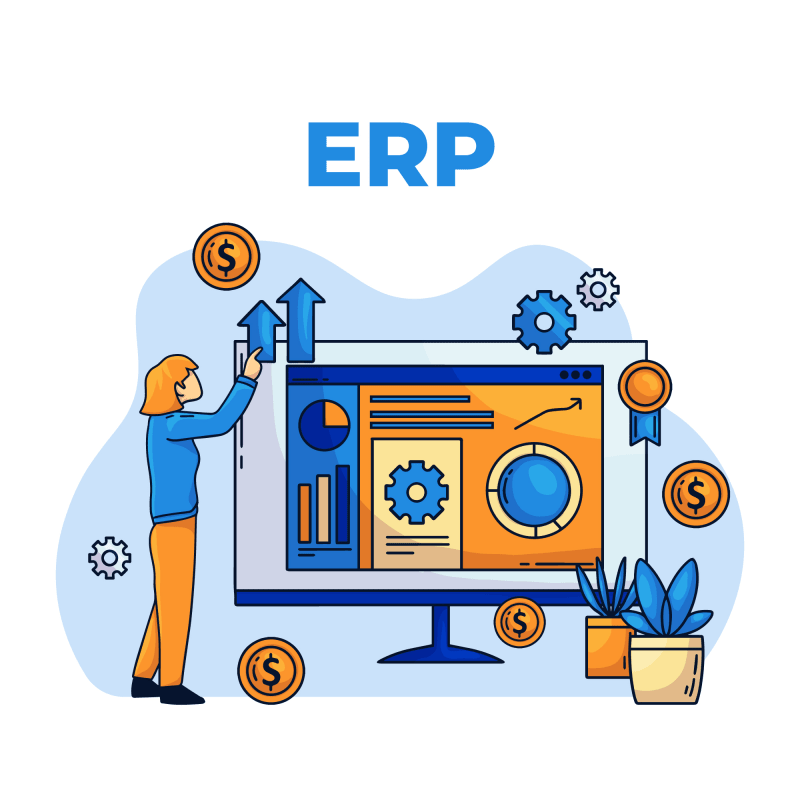In today's fast-paced and competitive business landscape, staying ahead of the curve is crucial for success. Enterprise Resource Planning software has emerged as a powerful tool to help businesses streamline their operations and gain a competitive edge. This blog will explore the top five benefits of implementing ERP software in your business.
1. Streamlined Processes and Increased Efficiency
One of the most significant advantages of ERP software is its ability to streamline business processes. ERP integrates various departments and functions within your organization, from finance and HR to inventory and sales. This integration eliminates duplicate data entry, reduces manual errors, and enhances overall operational efficiency.
Imagine a scenario where your sales team can access real-time inventory data, or your finance team can generate accurate financial reports with just a few clicks. ERP simplifies these processes, enabling your employees to focus on more value-added tasks, ultimately increasing productivity.
2. Enhanced Data Accuracy and Decision-Making
Only accurate or updated information can lead to costly mistakes and missed opportunities. ERP software centralizes your data, ensuring that all departments work with the same accurate, up-to-date information. This consistency not only reduces errors but also enhances decision-making.
With access to real-time data and powerful analytics tools, managers can make informed decisions promptly. Whether optimizing inventory levels, identifying sales trends, or forecasting future demand, ERP provides the insights needed to steer your business in the right direction.
3. Improved Customer Satisfaction
Customer satisfaction is the lifeblood of any business. ERP software can significantly enhance your ability to meet customer needs efficiently. With a 360-degree view of customer information, including purchase history and preferences, you can provide personalized experiences and deliver products or services more quickly.
Furthermore, ERP systems often include customer relationship management (CRM) modules that enable you to track customer interactions, manage leads, and respond to inquiries promptly. These capabilities contribute to stronger customer relationships and higher satisfaction rates.
4. Cost Savings and Resource Optimization
Cost control is a constant concern for businesses of all sizes. ERP software can help you manage your resources more effectively, reducing operational costs. By optimizing inventory levels, streamlining procurement processes, and automating routine tasks, you can cut unnecessary expenses.
Moreover, ERP systems offer insights into your financial performance, allowing you to identify areas where cost reductions or revenue enhancements are possible. This data-driven approach empowers you to make strategic decisions that positively impact your bottom line.
5. Scalability and Adaptability
As your business grows, so do your operational complexities. ERP software is designed to scale with your organization. Whether you're opening new locations, expanding into international markets, or diversifying your product offerings, ERP can adapt to meet your evolving needs.
Additionally, ERP systems are often modular, allowing you to add or remove functionalities as required. This flexibility ensures that you're only paying for what you need, reducing the total cost of ownership.
Conclusion
Incorporating ERP software into your business can be a transformative step toward greater efficiency, accuracy, and profitability. By streamlining processes, enhancing data accuracy, improving customer satisfaction, optimizing costs, and offering scalability, ERP empowers your organization to thrive in an increasingly competitive marketplace. Consider implementing ERP software as a strategic investment in your business's future success.



Top comments (2)
Grade ERP is a game-changer for businesses looking to streamline operations and drive growth.
It consolidates _HR/Recruiting, Sales, Finance, Project Management, Payroll, and Analytics _into one unified system, eliminating duplicate data entry and reducing manual errors. With real-time data and powerful analytics, Grade ERP enhances decision-making and boosts customer satisfaction by providing a 360-degree view of your operations. Its cost-saving capabilities, resource optimization, and scalability make it a smart investment that adapts as your business grows.
If you're aiming for increased efficiency and a competitive edge, Grade ERP is the comprehensive solution you need.
Some comments may only be visible to logged-in visitors. Sign in to view all comments.